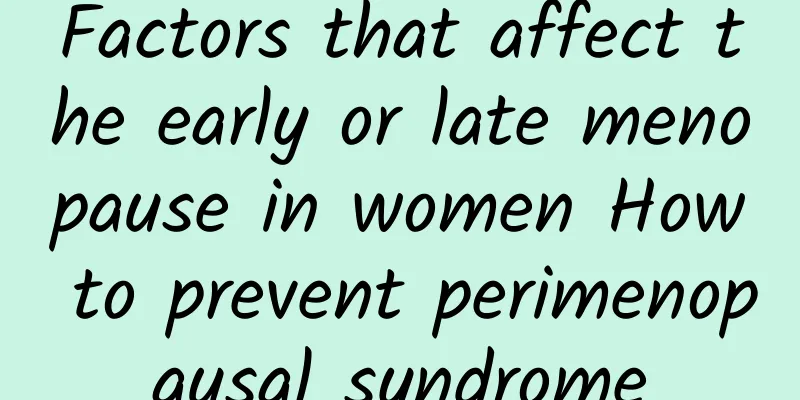Can I have intravenous infusion when menopausal syndrome occurs?

|
Generally, intravenous infusion is not required when menopausal syndrome occurs. Symptoms can be relieved by adjusting lifestyle, taking medication and psychological counseling. Menopausal syndrome is a group of symptoms caused by hormone fluctuations due to ovarian failure in women. Common manifestations include hot flashes, night sweats, mood swings, insomnia, etc. Infusion is not a routine treatment unless the patient is severely dehydrated or has other complications. 1. The onset of menopausal syndrome is closely related to the decline in estrogen levels. Ovarian dysfunction leads to fluctuations in estrogen levels in the body, affecting the stability of the autonomic nervous system, thus causing symptoms such as hot flashes and night sweats. Hormonal changes can also affect the emotional regulation center, leading to psychological symptoms such as anxiety and depression. These symptoms can usually be effectively controlled through non-drug intervention and drug regulation. 2. Adjusting your lifestyle is an important way to relieve menopausal symptoms. Maintaining a regular schedule and avoiding staying up late can help improve sleep quality. Appropriate aerobic exercise, such as walking, yoga, or swimming, can relieve hot flashes and mood swings. Adding foods rich in phytoestrogens to your diet, such as soybeans, flax seeds, and soy products, can help regulate hormone levels. Avoid consuming too much caffeine and alcohol to reduce the aggravation of symptoms. 3. Drug treatment is an effective means to relieve menopausal syndrome. Hormone replacement therapy (HRT) is a common method that relieves symptoms by supplementing estrogen, but it must be used under the guidance of a doctor and the risks and benefits must be assessed. Non-hormonal drugs such as selective serotonin reuptake inhibitors (SSRIs) or gabapentin can be used to relieve hot flashes and emotional symptoms. Chinese patent medicines such as Xiaoyao Pills and Kunbao Pills can also be used as auxiliary treatments. 4. Psychological counseling cannot be ignored in the management of menopausal syndrome. Menopausal women are often troubled by physical changes and mood swings. Psychological counseling or support groups can help them adjust their mentality and relieve anxiety and depression. Relaxation techniques such as mindfulness meditation and deep breathing exercises can also help improve mood and sleep. When menopausal syndrome strikes, there is no need for intravenous infusion. Symptoms can be effectively relieved through lifestyle adjustments, drug treatment and psychological counseling. If the symptoms seriously affect the quality of life, it is recommended to seek medical attention in time. The doctor will develop a personalized treatment plan based on the specific situation to help patients go through menopause smoothly. |
<<: What are the symptoms of spontaneous abortion infection?
>>: The incidence of physiological ovarian cysts
Recommend
Good living habits are the best way to prevent ectopic pregnancy
Ectopic pregnancy can be said to be the most comm...
Burn fat and get thinner the more you eat, 7 foods help burn fat! Experts: Eating eggs and drinking coffee can help you lose weight easily
Losing weight has always been one of the goals pu...
How to cure cervicitis
Cervicitis is a common disease in women of childb...
Lose fat and lose weight? Balanced diet, low-sugar diet, ketogenic diet, 3 pictures to understand the advantages and disadvantages in seconds!
What is the healthiest way to eat? How to eat to ...
Experience in nursing care for patients with amenorrhea
Amenorrhea is a common symptom of gynecological d...
What is the treatment method for female vaginitis?
What are the treatment methods for female vaginit...
How to best treat uterine fibroids?
How to best treat uterine fibroids? There is no b...
Will eating after exercise make you lose weight faster? Eating the right things and the right amounts is the key!
What the Cofit Nutrition Team wants to tell you i...
What are the characteristics of the symptoms of cervical warts at different stages?
In recent years, the number of women suffering fr...
Lose weight healthily and keep your cleavage! Famous weight loss doctor: The key lies in hormones
In winter, people are crazy about losing weight, ...
Introduction to six common symptoms of uterine fibroids
Uterine fibroids are a common tumor that grows in...
How long does it take to have an abortion after an unexpected pregnancy? It is important to choose the right time for abortion
Failure to take proper contraceptive measures can...
Can B-ultrasound detect intrauterine adhesions? Explore the self-examination method of intrauterine adhesions
Intrauterine adhesion is one of the common reprod...
What should you pay attention to when caring for bacterial vaginosis?
Some women, after suffering from gynecological di...
What are the specific manifestations of cervicitis?
Gynecological diseases, especially cervicitis, ar...









